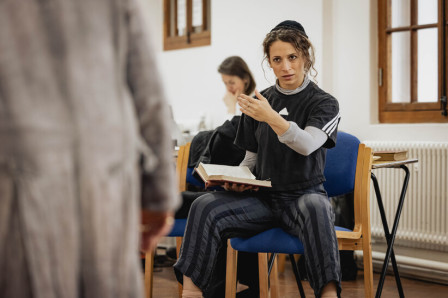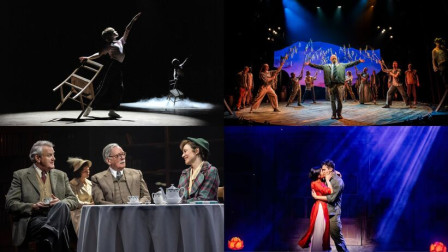Review: The Pianist of Willesden Lane at the St James Theatre
 Should you find yourself suffering from the post-Christmas January blahs I would like to suggest that you quickly get yourself to the St. James theatre to see the soul stirring ‘The Pianist of Willesden Lane’. I can assure you that this unique combination of play and classical piano concert performed with love and humanity by the talented concert pianist Mona Golabek is just the type of theatrical experience you need at this dark time of year.
Should you find yourself suffering from the post-Christmas January blahs I would like to suggest that you quickly get yourself to the St. James theatre to see the soul stirring ‘The Pianist of Willesden Lane’. I can assure you that this unique combination of play and classical piano concert performed with love and humanity by the talented concert pianist Mona Golabek is just the type of theatrical experience you need at this dark time of year.
Based on the book The Children of Willesden Lane the play tells the true story of Golabek’s mother, Lisa Jura, who arrived in the United Kingdom during World War II on the Kindertransport. A promising classical pianist, Lisa Jura was from a well to-do, musical Jewish family from Vienna. Following the Kristallnacht riots her father was able to get only one ticket on the Kindertransport and Lisa was sent to the UK whilst her parents and two sisters remained in Vienna. Luckily once in London Jura is settled in a hostel for refugee children on Willesden Lane run by a force of nature called Mrs Cohen who eventually assists Jura in gaining a scholarship at the Royal Academy of Music.
The play itself is a unique combination of dialogue and classical piano concert. Golabek, who is a well-respected concert pianist, manages to perform segments of over fifteen classical piano pieces whilst also bringing to life all the characters in the story. Though her acting is at times somewhat less than impressive it doesn’t really matter as her passion for the story and her incredible piano playing make up for any shortcomings in her abilities as an actress.
The set is dominated by a wonderful grand piano and the acoustics in the St James are fantastic. You almost cannot believe such a lush sound is coming from that one piano. Directed simply and effectively by Hershey Felder, who also adapted the book for the stage, the evening includes evocative projection design by Andrew Wilder that ensures the show remains visually interesting.
My companion and I left the theatre truly touched by the story and eager to discuss the many ideas and themes that came up in the play. We also couldn’t help but notice the parallels with today’s refugee crisis in Europe. Perhaps Golabek’s programme notes sum it up best when she writes “I hope that the play inspires this generation to follow in the noble footsteps of what the British people did for the 10, 000 children of the Kindertransport. Let this story also enrich the passion and music that lie in each of us”.
Latest News

 Review: SEA WITCH at Theatre Royal Drury Lane
2 March 2026 at 12:07
Review: SEA WITCH at Theatre Royal Drury Lane
2 March 2026 at 12:07

 YENTL at Marylebone Theatre - Rehearsal images released
2 March 2026 at 08:25
YENTL at Marylebone Theatre - Rehearsal images released
2 March 2026 at 08:25

 This Month in the West End (February 2026)
27 February 2026 at 16:45
This Month in the West End (February 2026)
27 February 2026 at 16:45

 Cameron Mackintosh reveals extension periods for West End productions to 2027
27 February 2026 at 16:08
Cameron Mackintosh reveals extension periods for West End productions to 2027
27 February 2026 at 16:08
